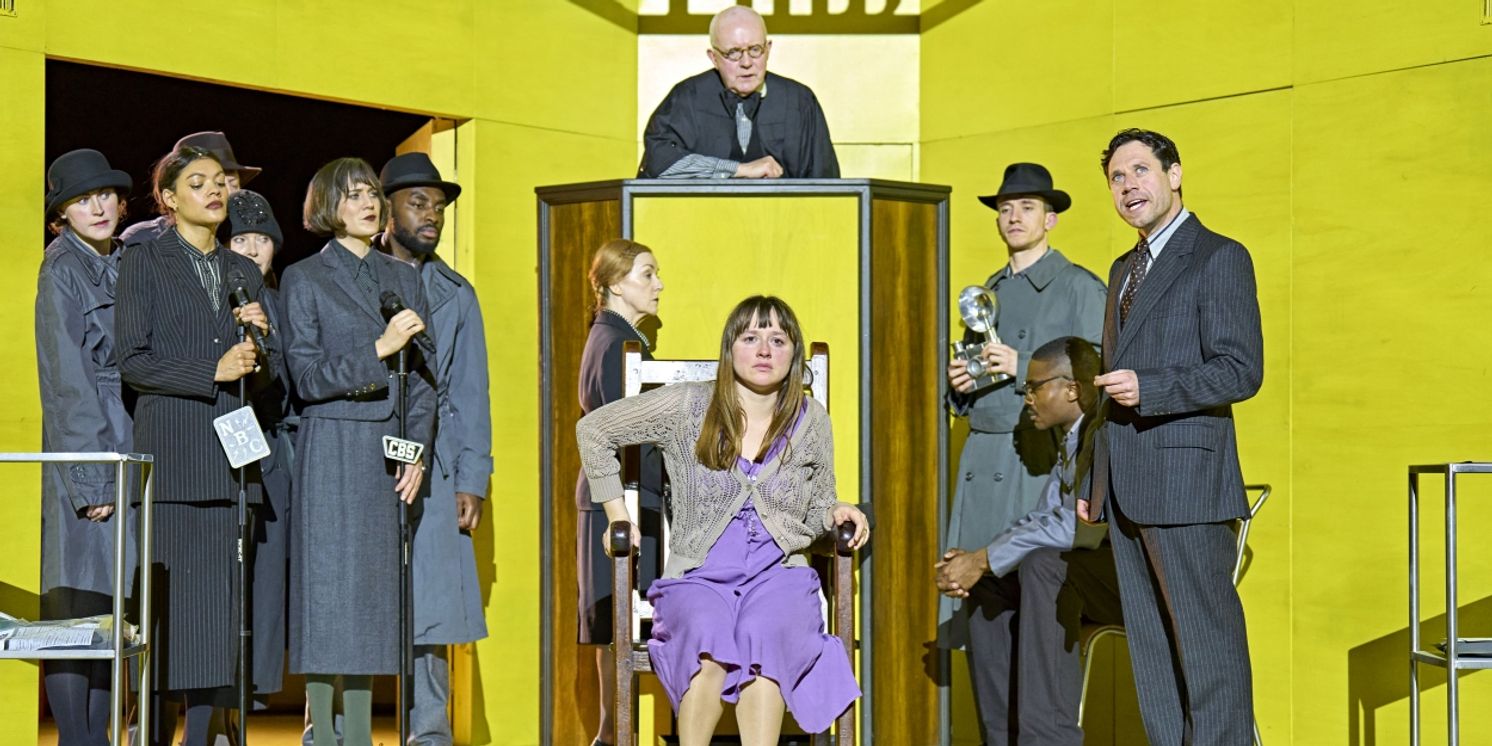Review: MACHINAL, The Old Vic
Rosie Sheehy commands the stage with an intensity in an ultimately unsatisfactory play

 My mother was ahead of her time. Long before the current, seemingly insatiable, demand for true crime podcasts got off the ground, she bought the trashy magazines and read the sensationalist books, always well-thumbed by borrowers at the library. I recall learning very early in life that there were murderers who deserved no sympathy and murderers who deserved some, maybe a whole lot more than that. These two groups’ figureheads were made flesh in the infamous photographs of the platinum blondes, Myra Hindley and Ruth Ellis, the latter executed in Holloway Prison at just 28 (see, I’m still doing it now).
My mother was ahead of her time. Long before the current, seemingly insatiable, demand for true crime podcasts got off the ground, she bought the trashy magazines and read the sensationalist books, always well-thumbed by borrowers at the library. I recall learning very early in life that there were murderers who deserved no sympathy and murderers who deserved some, maybe a whole lot more than that. These two groups’ figureheads were made flesh in the infamous photographs of the platinum blondes, Myra Hindley and Ruth Ellis, the latter executed in Holloway Prison at just 28 (see, I’m still doing it now).
My long-gone mother would have liked, understood even, Machinal, Sophie Treadwell’s coruscating 1928 indictment of what we now call The Patriarchy, rather more than her son. Where I saw an entitled woman whose bad marriage at least lifted her out of the drudgery of office life, she would have seen a woman trapped at every turn. Where I saw a person in the grip of a neurosis for which she had the means and motivation to have sought medical help, she would have seen a highly strung wife suffering with her nerves. Where I saw an over-reaction to a situation not uncommon inside marriages even today, she would have seen a crime passionnel, condemnation mitigated by circumstances.
Both views are reasonable responses to what we see. That director, Richard Jones, finds this ambiguity in the drama would normally be a matter for praise, but I’m going to qualify that later.
%20and%20Pierro%20Niel-Mee%20(Young%20Man)%20in%20Machinal%20at%20The%20Old%20Vic%20%E2%80%94%20credit%20Manuel%20Harlan.jpg?format=auto&width=1400)
Based loosely on the case of Ruth Snyder, a murder trial that fascinated Prohibition-era America as much as her namesake's gripped England a generation later, the play filters her life through an expressionistic lens, making the now renamed Helen Jones as much of an everywoman as that bland name suggests.
Rosie Sheehy, reprising her totally committed inhabiting of the role on the production’s transfer from the Ustinov Studio at the Theatre Royal Bath, is initially a blank canvas, sullen and persistently late into work as a typist in an office that resents her special treatment as the boss’s favourite. At home, she is quick to anger and physically threaten her nagging mother, whom she supports from her teen years (a fine turn from Buffy Davis).
She soon grows to hate her insensitive husband, that same boss who, having put a ring on her finger, is now furnished with the belief that he can paw away at her to his heart’s delight (Tim Frances finding the misguided, selfish love in the character). And she finds partial release from the spiralling descent from neurosis to psychosis in the arms of a badboy, outlaw lover, Pierro Niel-Mee all transgressive temptation, who satisfies her sexually in bed but later betrays her in court.
Hyemi Shin’s set, a yellow space that reflects the protagonist’s mental state that everywhere is more or less the same except for a few props, soon starts to acquire an ochre quality, the colour of a bruise turning poisonous - a metaphor, of course, for the heroine/anti-heroine’s state of mind.
And there hangs the nagging doubt that clings to any reflection on the play. Sheehy delivers the intensity of the role, but she gives the accused woman few redeeming characteristics and her provocations - her workmates don’t really bully her, her mother is hardly extreme in her barely controlling behaviour, her husband is more neglectful than abusive - are so relatively meagre that her brutal act and almost voluntary walk to The Chair make her an unsympathetic character. Yet, partly due to expectations raised by our long experience of being pointed towards a sorting heroes and villains, it does feel like our sympathies are being directed towards her, continually left powerless by men, individually or en masse. But the play, perhaps this production, needs to do more to earn that lean into one of its potential judgments, though I concede that, more than most evaluations, that will be a subjective response to what each individual perceives. Is she really more Ellis than Hindley?
Coming in at a gruelling 100 minutes all-through (the release of a beautiful, ethereal singing interlude in the denouement was most welcome), the play is not an easy watch. Whether it’s worth the emotional investment required on both sides of the fourth wall for its equivocating payoff is moot. I was certainly amongst what will probably be a minority, left unmoved and glad to escape the yellow peril in which I had been trapped for two hours or so, my sympathies lying more with the unseen, unmentioned working class women then, and now, struggling to feed themselves and their children in a world as cruel as ever towards those who can’t fit in.
Machinal at The Old Vic until 1 June
Photo Credits: Manuel Harlan
Reader Reviews
Powered by
|
Videos

